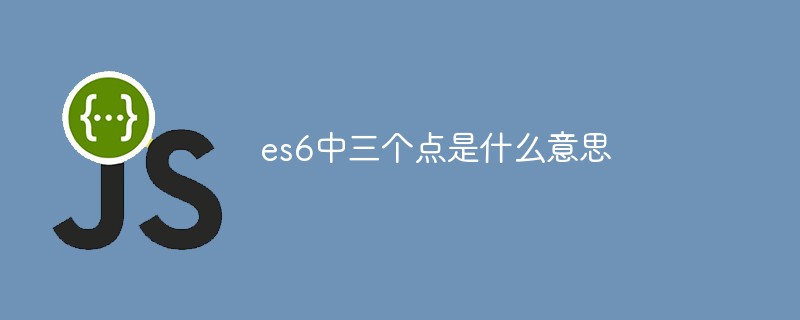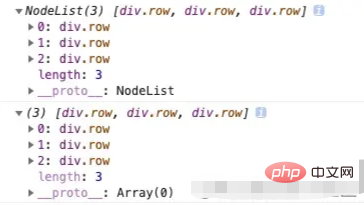在es6中,三个点“…”指的是“扩展运算符”,可以在函数调用或数组构造时,将数组表达式或者string在语法层面展开;也可以在构造字面量对象时将对象表达式按照“key-value”的方式展开。

本教程操作环境:windows7系统、ECMAScript 6版、Dell G3电脑。
es6中三个点是什么意思
三个点(...)真名叫扩展运算符,是在ES6中新增加的内容,它可以在函数调用/数组构造时,将数组表达式或者string在语法层面展开;还可以在构造字面量对象时将对象表达式按照key-value的方式展开
字面量一般指[1,2,3]或者{name:'chuichui'}这种简洁的构造方式,多层嵌套的数组和对象三个点就无能为力了
说白了就是把衣服脱了,不管是大括号([])、花括号({}),统统不在话下,全部脱掉脱掉!
// 数组 var number = [1,2,3,4,5,6] console.log(...number) //1 2 3 4 5 6 //对象 var man = {name:'chuichui',height:176} console.log({...man}) / {name:'chuichui',height:176}
扩展运算符的8种用法
1. 拷贝数组对象
使用扩展符拷贝数组是ES6中常用的操作:
const years = [2018, 2019, 2020, 2021]; const copyYears = [...years]; console.log(copyYears); // [ 2018, 2019, 2020, 2021 ]
扩展运算符拷贝数组,只有第一层是深拷贝,即对一维数组使用扩展运算符拷贝就属于深拷贝,看下面的代码:
const miniCalendar = [2021, [1, 2, 3, 4, 5, 6, 7], 1]; const copyArray = [...miniCalendar]; console.log(copyArray); // [ 2021, [ 1, 2, 3, 4, 5, 6, 7 ], 1 ] copyArray[1][0] = 0; copyArray[1].push(8); copyArray[2] = 2; console.log(copyArray); // [ 2021, [ 0, 2, 3, 4, 5, 6, 7, 8 ], 2 ] console.log(miniCalendar); // [ 2021, [ 0, 2, 3, 4, 5, 6, 7, 8 ], 1 ]
把打印的结果放在一起便于更加清楚进行对比,如下:
| 变量说明 | 结果 | 操作 |
|---|---|---|
copyArray |
[ 2021, [ 1, 2, 3, 4, 5, 6, 7 ], 1 ] |
复制数组 miniCalendar |
copyArray |
[ 2021, [ 0, 2, 3, 4, 5, 6, 7, 8 ], 2 ] |
1. 将数组第二个元素的第一个元素重新赋值为 0 ;2. 往数组的第二个元素增加一个元素 8 ;3. 将数组第三个元素重新赋值为2 |
miniCalendar |
[ 2021, [ 0, 2, 3, 4, 5, 6, 7, 8 ], 1 ] |
从结果来看,数组的第二个元素为数组,大于1维了,里面的元素的变更将导致原变量的值随之改变 |
拷贝对象,代码如下:
const time = { year: 2021, month: 7, day: { value: 1, }, }; const copyTime = { ...time }; console.log(copyTime); // { year: 2021, month: 7, day: { value: 1 } }
扩展运算符拷贝对象只会在一层进行深拷贝,从下面代码是基于上面代码:
copyTime.day.value = 2; copyTime.month = 6; console.log(copyTime); // { year: 2021, month: 6, day: { value: 2 } } console.log(time); // { year: 2021, month: 7, day: { value: 2 } }
从打印的结果看,扩展运算符只对对象第一层进行了深拷贝。
严格来讲,扩展运算符不执行深拷贝
2. 合并操作
先来看数组的合并,如下:
const halfMonths1 = [1, 2, 3, 4, 5, 6]; const halfMonths2 = [7, 8, 9, 10, 11, 12]; const allMonths = [...halfMonths1, ...halfMonths2]; console.log(allMonths); // [ 1, 2, 3, 4, 5, 6, 7, 8, 9, 10, 11, 12 ]
合并对象,在合并对象时,如果一个键已经存在,它会被具有相同键的最后一个对象给替换。
const time1 = { month: 7, day: { value: 1, }, }; const time2 = { year: 2021, month: 8, day: { value: 10, }, }; const time = { ...time1, ...time2 }; console.log(time); // { month: 8, day: { value: 10 }, year: 2021 }
3. 参数传递
const sum = (num1, num2) => num1 + num2; console.log(sum(...[6, 7])); // 13 console.log(sum(...[6, 7, 8])); // 13
从上面的代码看,函数定义了多少个参数,扩展运算符传入的值就是多少个。
和 math 函数一起使用,如下:
const arrayNumbers = [1, 5, 9, 3, 5, 7, 10]; const min = Math.min(...arrayNumbers); const max = Math.max(...arrayNumbers); console.log(min); // 1 console.log(max); // 10
4. 数组去重
与 Set 一起使用消除数组的重复项,如下:
const arrayNumbers = [1, 5, 9, 3, 5, 7, 10, 4, 5, 2, 5]; const newNumbers = [...new Set(arrayNumbers)]; console.log(newNumbers); // [ 1, 5, 9, 3, 7, 10, 4, 2 ]
5. 字符串转字符数组
String 也是一个可迭代对象,所以也可以使用扩展运算符 ... 将其转为字符数组,如下:
const title = "china"; const charts = [...title]; console.log(charts); // [ 'c', 'h', 'i', 'n', 'a' ]
进而可以简单进行字符串截取,如下:
const title = "china"; const short = [...title]; short.length = 2; console.log(short.join("")); // ch
6. NodeList 转数组
NodeList对象是节点的集合,通常是由属性,如Node.childNodes和方法,如document.querySelectorAll返回的。
NodeList 类似于数组,但不是数组,没有 Array 的所有方法,例如find、map、filter 等,但是可以使用 forEach() 来迭代。
可以通过扩展运算符将其转为数组,如下:
const nodeList = document.querySelectorAll(".row"); const nodeArray = [...nodeList]; console.log(nodeList); console.log(nodeArray);

7. 解构变量
解构数组,如下:
const [currentMonth, ...others] = [7, 8, 9, 10, 11, 12]; console.log(currentMonth); // 7 console.log(others); // [ 8, 9, 10, 11, 12 ]
解构对象,如下:
const userInfo = { name: "Crayon", province: "Guangdong", city: "Shenzhen" }; const { name, ...location } = userInfo; console.log(name); // Crayon console.log(location); // { province: 'Guangdong', city: 'Shenzhen' }
8. 打印日志
在打印可迭代对象的时候,需要打印每一项可以使用扩展符,如下:
const years = [2018, 2019, 2020, 2021]; console.log(...years); // 2018 2019 2020 2021
总结
扩展运算符 … 让代码变得简洁,应该是ES6中比较受欢迎的操作符了。
【
 站长资讯网
站长资讯网